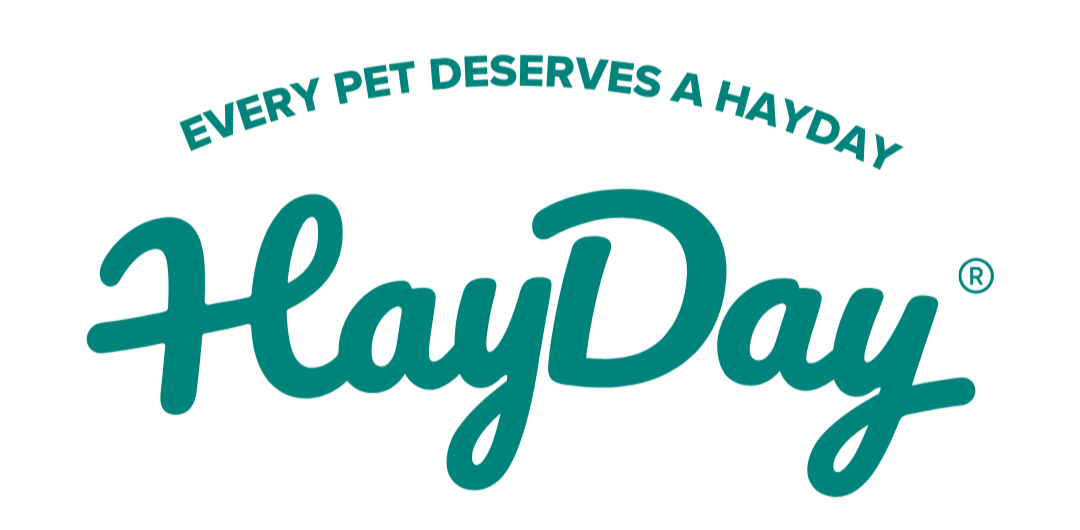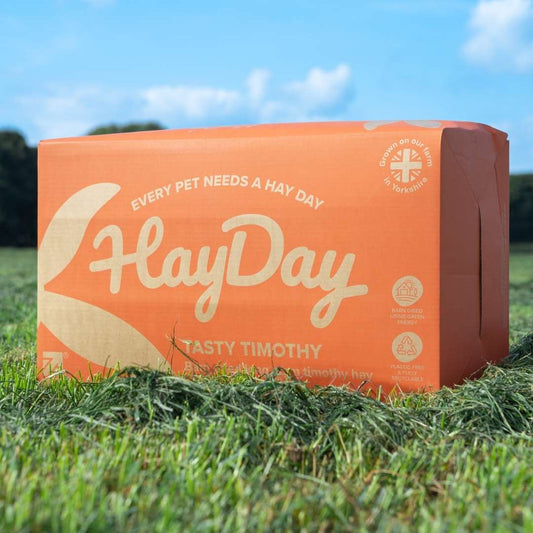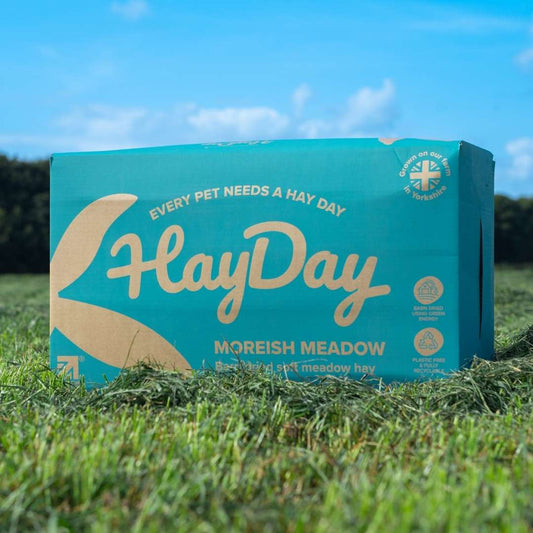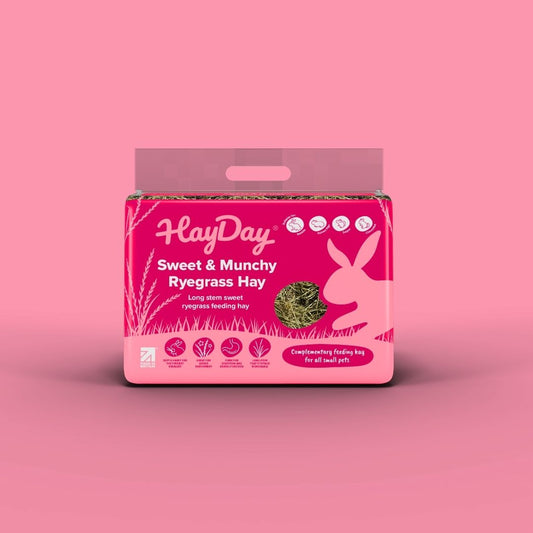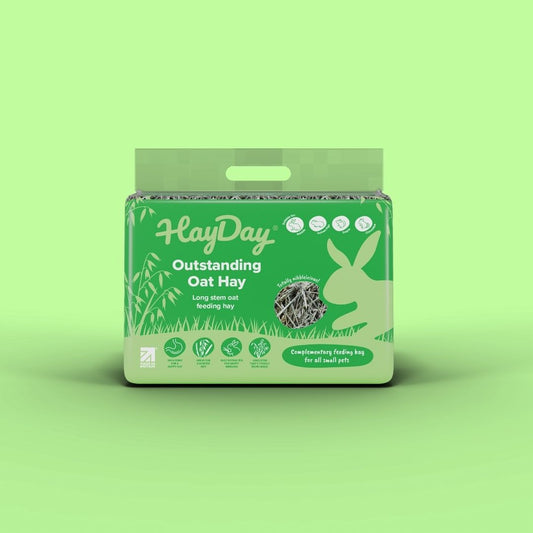As an occasional treat, it is completely fine for bunnies to be fed a slice (or two!) of banana.
However, like most fruits, bananas are high in sugar and therefore should be fed sparingly to maintain your rabbit’s health.
As hay experts, we are advocates for ensuring that rabbits get the best nutrition. Our guide will help advise that feeding, on top of an unlimited amount of high-quality premium hay, you can add extra treats safely into your rabbits diet.
Read on to understand the safe ways to include this fruit, and other human foods in your rabbit’s diet.
Feeding a Rabbit Banana - Overview
-
Rabbits can eat bananas in moderation, but due to high sugar content, these should be given as occasional treats and not make up a significant portion of their diet.
-
A balanced rabbit diet should include a variety of vegetables, and leafy greens alongside staple foods like premium, barn dried rabbit hay and rabbit safe pellets. With all new foods introduced slowly to monitor any potential health issues.
So, Can Rabbits Eat Bananas?
Let’s address our main query first: Can rabbits consume bananas? The answer is yes it is a safe human food for rabbits, but with careful portions put into place. Whilst they can relish their sweetness, it’s important to regulate how much banana you give your rabbit.
Bananas are not harmful in themselves; however, they contain a high amount of sugar, which can lead to potential digestive issues. We don't want to upset your rabbit's sensitive tummies with overfeeding bananas and any fruits for that matter!
Nutritional Value of Bananas for Rabbits
Beyond being a delightful snack, bananas also provide significant nutritional benefits. They are a good source of potassium, which is beneficial for a rabbit’s muscle function and overall health.
Beyond potassium, bananas also offer vitamin C, which can contribute to the immune system health of rabbits. Moreover, the dietary fibre in bananas aids the digestive system of rabbits, helping to maintain correct gut function.
Sugar and Carbohydrate Concerns
Despite being popular with our furry friends, the high sugar and carbohydrate content in bananas can be a concern. Too much of these sweet fruits can lead to obesity in rabbits.
It's crucial to remember that bananas should not make up a significant portion of a rabbit’s diet; they should only be offered as an occasional treat.
Can Rabbits Eat Banana Peels?
Having established the role of bananas in a rabbit’s diet, it’s time to turn our focus to the peel. It might surprise you to learn that rabbits can safely consume banana peels.
This seemingly unappetising part of the banana is not only safe but also has its own set of nutritional benefits.
Yet, similar to the fruit itself, certain factors need to be considered when offering banana peels to your rabbit. Let’s peel back the layers of this topic, shall we?
Nutritional Benefits of Banana Peels
So, what makes banana peels a worthy addition to your bunny’s diet? For starters, banana peels are a source of dietary fibre, which is beneficial for a rabbit’s gut health and digestion.
Apart from fibre, banana peels also offer antioxidants and essential vitamins like B6 and C, providing additional nutritional value to a rabbit’s diet.
Adding banana peels to their diet can help to diversify the nutrients they receive. But before you start freely feeding banana peel to your rabbit, there are a few things to consider:
Potential Hazards and Precautions
Carefulness is paramount when providing banana peels to rabbits and can make it an unsafe food for rabbits.
Thorough washing of banana peels is necessary to remove any residual pesticides or contaminants before offering them to rabbits. It is also key to note that rabbit peel should be cut, into the appropriate feeding slices instead of being offered as a whole!
With these precautions in place, your rabbit can safely enjoy the occasional banana peel treat.
Alternatives to Bananas: Other Fruits and Veggies for Rabbits
Although bananas and their peels can serve as delightful treats for rabbits, they are not the only alternatives.
Offering a variety of fruits, vegetables, and leafy greens can contribute to a balanced diet for your rabbit and ensures they get a wide range of nutrients. Some other options to consider include:
-
Blueberries
-
Carrots
-
Spinach
-
Strawberries
Keeping your rabbits, and other small pets, enriched will in turn encourage them to forage and nibble more! Like humans, our small pets appreciate the change in their diet with a tasty treat.
In the subsequent sections, we will explore a range of safe fruits, vegetables, and herbs that your rabbit can consume. These can serve as alternatives to bananas or as additions to diversify the diet.
Safe Fruits for Rabbits
When it comes to fruits, there’s a whole fruit salad of options that are safe for rabbits to consume. These should be given sparingly and in small amounts due to the high sugar content found in most fruits. Safe fruits for rabbits include:
-
Berries
-
Cherries (pits removed)
-
Grapes
-
Melon
-
Nectarine
-
Orange
-
Papaya
-
Peach
-
Pear
-
Plum
-
Watermelon
Vegetables and Leafy Greens
Moving on to vegetables, these can be a daily part of your rabbit’s diet. Safe vegetables for rabbits include:
-
Bok Choy
-
Brussels sprouts
-
Carrot tops
-
Cucumber
-
Endive
-
Fennel
- Certain types of lettuce (such as romaine lettuce)
- Rocket
Leafy green vegetables, like broccoli, carrots, chard, collard greens, dandelion greens, kale, and spinach, should be included in a rabbit’s diet occasionally to maintain a healthy and balanced diet.
When introducing green veggies, always ensure they are clean, safe, and integrated into the rabbit’s diet with caution. The recommended period is over 7 to 14 days.
Herbs and Edible Flowers
Herbs and edible flowers can add a touch of variety to your rabbit’s diet. Some safe herbs for rabbits include:
-
Basil
-
Cilantro
-
Dill
-
Mint
-
Oregano
-
Parsley
-
Rosemary
-
Sage
-
Thyme
These herbs may aid in digestion and promote overall well-being for rabbits.
In addition to herbs, there are a variety of edible flowers that rabbits can safely enjoy. Some examples include:
-
Calendula
-
Chamomile
-
Daisy
-
Dandelions
-
Hibiscus
-
Honeysuckle
-
Marigold
-
Nasturtium
-
Pansy
-
Roses
These flowers can add a pop of colour to your rabbit’s diet and provide additional nutritional benefits.
Our top tip: Sprinkle these herbs on top of your rabbits favourite hay (such as Timothy Hay or Meadow Hay) to enrich them and encourage them to have a greater hay intake. Tasty!
Recognising When Bananas Aren't Suitable for Your Rabbit
While bananas can make for a fantastic occasional snack for rabbits, and some foods may not be suitable for all rabbits.
Some rabbits might experience digestive issues, weight gain, or may even have an allergic reaction to bananas.
It’s crucial to monitor your rabbit closely for signs of discomfort after introducing bananas (as well as any new fruit), as these can be indications of digestive issues.
We would always recommend you seeking the advice of an exotic vet for any information or symptoms that you're unsure of. If you notice any adverse reactions when introducing new foods to your rabbit, consult your vet immediately.
Creating a Balanced Diet for Your Rabbit
As discussed in this post, maintaining a balanced diet for your rabbit is of utmost importance. A rabbit’s natural diet includes a variety of:
-
High-quality premium hay such as Timothy Hay, Meadow Hay or Ryegrass Hay
-
An egg-cup full of rabbit safe pellets
-
A handful of leafy greens
-
Water
-
The occasional treat such as fruits
The Importance of High Quality Hay
Being hay experts, we care deeply about its importance to rabbits, guinea pigs and other small pets.
Staples such as Timothy Hay and Meadow Hay are perfect for providing fibre for digestive health, and their long stems assist in wearing down their constantly growing teeth.
Rabbits need continuous access to hay day and night, with the recommended amount being at least as large as their body weight. Please refer to our rabbit feeding guideline for more information.
The hay provided to rabbits should be of high quality and meet the following criteria:
-
Barn dried
-
Dust extracted
-
Long Stem
At HayDay, we don't just care about the high quality hay that we produce for your small pets - but we care deeply about the environment too. We only use 100% plastic free materials and we have introduced more sustainable farming practices on our family farm too.
As a small business, we're pretty proud of what we do and we are continuously looking for ways in which we can improve the things we do.
Summary
So, in this guide we have hopped down the rabbit hole and hopefully educated you with a wealth of knowledge on rabbits and where banana exactly fits into their diets.
From the sweet treat of bananas and the unexpected benefits of banana peels, to the importance of a balanced diet - we’ve covered it all.
Remember, every bunny is unique. Introduce new foods gradually, and always monitor your rabbit for any signs of discomfort or allergic reactions.
As nutritional hay lovers, our goal is to ensure our furry friends lead a happy and healthy life. Let’s make every nibble count!
Relevant Advice
Banana's - The Nutrition Source
Frequently Asked Questions
Is banana peel safe for rabbits?
Yes, banana peels are safe for rabbits and can provide dietary fibre and essential vitamins for their diet.
What other fruits and vegetables can rabbits eat?
Yes, rabbits can also enjoy eating fruits and vegetables such as apples, berries, bell peppers, and bok choy. You should always introduce new foods gradually, over a period of 7 to 14 days - and remember... Veggies should only make up 5-10% of a rabbit's diet and fruit should be offered occasionally as a sweet treat.
What should I do if my rabbit has a negative reaction to bananas?
If your rabbit has a negative reaction to bananas, consult a vet immediately for guidance. Take their advice seriously to ensure your rabbit's health and well-being.
